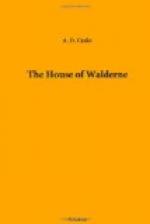“He is a man of God, and I doubt not thou art worthy of his love, for he writes of thee as a father might of a much-loved son. But now, my son, we must break our fast. Come to the refectorium with me.”
Passing into the cloister they came to the dining hall or “refectorium.” Three long tables, a fourth where the elders and professors sat, on a raised platform at right angles to the others. A hundred men and boys had already assembled, and after a Latin grace, breakfast began. It was not a fast day, so the fare was substantial, although quite plain—porridge, pease soup, bread, meat, cheese, and ale. The most sober youth of the university were there, men who meant eventually to assume the gray habit, and carry the Gospel over wilderness and forest, in the slums of towns, or amongst the heathen, counting peril as nought. There was no buzz of conversation, only from a stone pulpit the reader read a chapter from the Gospels.
After this was done, grace after meat was said, and the elders first departed, the great master taking Martin back with him into his cell.
“And now, my son, what dost thou come to Oxford for?”
“To learn that I may afterwards teach.”
“And what dost thou desire to become?”
“One of your holy brotherhood, a brother of Saint Francis.”
“Dost thou know what that means, my son? Scanty clothing, hard fare, the absence of all that men most value, the welcoming of perils and hardships as thy daily companions, that thou mayst take thy life in thy hand, and find the sheep of Christ amongst the wolves.”
“All this I have been told.”
“Well, my son, thou art yet new to the world. At Oxford thou will see it, and will make thy choice better when thou knowest both what thou rejectest and what thou seekest. Meanwhile, guard thy youthful steps; avoid quarrelling, fighting, drinking, dicing; mortify thine own flesh—”
“Do these temptations await me in Oxford?”
“The air has been full of them, since Henry brought the thousand students from the gay university of Paris hither. Thou wilt soon see, and gauge thy power of resisting temptation. I would not say, stay indoors. The virtue which has never been tested is nought.”
“Where do the brethren chiefly work for God?”
“In the noisome lazar houses, amongst the lepers, in the shambles of Newgate, here on the swamps between the walls and the Thames, where men live and suffer. We do not enter the brotherhood to build grand buildings. We sleep on bare pallets without pillows.”
“Why without pillows?” asked Martin, wondering.
“We need no little mountains to lift our heads to heaven. None but the sick go shod.”
“Is it not dangerous to health to go without shoes in the winter?”
“God protects us,” said the master, smiling sweetly. “One of our friars found a pair of shoes last winter on a frosty morning, and wore them to matins. At night he had a dream. He dreamt that he was travelling on the work of God, and that at a dangerous pass in the forest of the Cotswolds, robbers leapt out upon him, crying, ’Kill, kill.’




